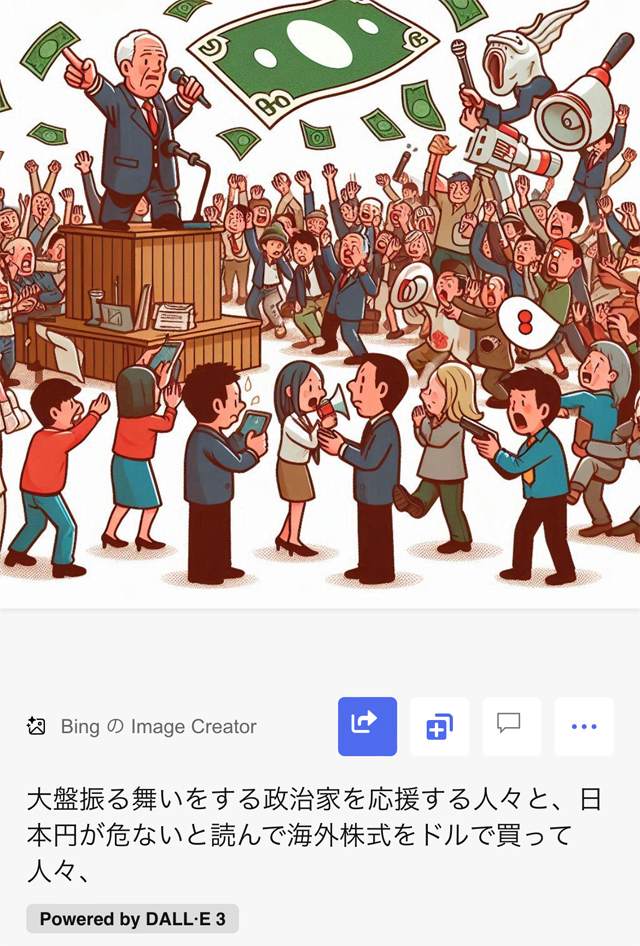|


|
ポピュリズムと日本国債の暴落
Populism and plummeting of Japan government bond prices
ポピュリズム(populism)とは、一般市民の意見や利益を強調し、エリートや既存の政治秩序に対抗する政治運動やイデオロギーを指します。この言葉はラテン語の「ポプルス」(人々)に由来し、大衆の不満や願望に耳を傾ける形で支配勢力に対抗することから「大衆迎合主義」とも訳されます。
ポピュリズムは、特に経済的不平等や政治的な不満が高まる時期に台頭しやすく、一般市民の声を代弁することを主張するリーダーや政党が指示を集める事が多いです。
ポピュリズムには民衆の声を政治に反映させるという利点がある一方で、社会の分断を深めるリスクがあります。この様な政治スタイルは、時に民主主義の基本原則である多様性や寛容性を脅かす事があります。
(by Copilot,Bing)
政治には「危機への対処」をテコに支出拡大に向かう慣性がある。財政支出の拡大は選挙民に分かりやすく、手っ取り早い集票の手段として利用される。これまでは投票率の高い高齢層や、国民の多くが働く中小企業に向けた財政支援策が、多く盛り込まれてきた。そこに、防衛予算や少子化対策が追加された。このままでは、財政赤字は拡大が続くばかりだ。こうした情勢のもとで、日銀は異次元緩和と称して大量かつ長期にわたり国債を買い入れてきた。政府はみずからの資金繰りを心配する必要がなくなり、金利もゼロ近傍で資金調達できるようになった。金利がゼロであればいくら借金を重ねても、当面は懐が傷まない。支出を拡大しようとする政治の世界にとっては、これほど有難い状況はなかった訳である。(Yahoo、 抜粋元・山本謙三「異次元緩和の罪と罰」(講談社現代新書)
日本国債の外国人保有者割合は過去20年間で徐々に増加してきました。2004年 約5%、2010年 約7%、2015年 約10%、2020年約13%、2024年予想約13.3%
(by Copilot,Bing)
日本国債が暴落すると投資家は日本円を避ける傾向が強まり、円安が進む可能性があります。これは投資家がリスクを避けるために円を売り、より安全な資産(例えばドル)に資金を移すためです。
日本国債の暴落は、国内の金融市場全体に不安をもたらし、株式市場にも悪影響を及ぼす事が考えられます。特に、金融機関や国債を多く保有している企業の株価が大きく下落する可能性があります。
(by Copilot,Bing)
(注)日本国債の暴落は外国人投資家の売り浴びせに始まる。これまで何度も仕掛けられ、防戦を続けて逃れてきたが、外国人の保有比率が高まるにつれて危険な度合いは高まる。
2022年日本経済は何処に向かって行くのか、その対応策、
2020年急激なインフレの可能性に対しどう対応すべきか、
2019年日本の財政と我々の生活、
2018年日本の財政上の問題点、
Populism and plummeting of Japan government bond prices
1. Populism refers to political movements and ideologies that emphasize
the opinions and interests of ordinary citizens and oppose elites and the
existing political order. The word comes from the Latin work "populus(people)",
which translates as "populism" because it is a way to counter
the ruling forces by
listening to the grievances and aspirations of the masses.
Populism is particularly vulnerable to emergence during periods of heightened
economic inequality and political discontent, and is often directed by
leaders and parties that claim to represent the voices of ordinary citizens.
While populism has the advantage of reflecting the voices of the people
in politics, it risks deepening social divisions. This style of government
sometimes threatens the fundamental principles of
democracy, diversity and tolerance. (by Copilot, Bing)
2.In politics there is an inertia to increase spending using "crisis
response" as leverage. Increased spending is easy for the electorate
to understand, and it is used as a quick way to collect votes. Until now,
many finacial support measures have been included for the elderly with
high voter turnout and for small and medium-sized enterprises(SMEs), where
many of the people work. In addition, the defense budget and measures to
address the declining birthrate were added. If this trend continues,the
budget deficit will only continue to grow. Under these circumstances, the
Bank of Japan has been purchasing a large amount of government bonds for
a long period of time under the guise of unprecedented easing. The government
no longer has to worry about its own cash flow,and it can raise funds at
interest rates close to zero. If the interest rate is zero, no matter how
much debt you accumulate, your pocket will not be damaged for the time
being. For the political world of trying to increase spending, there has
never been a more fortunate situation. (Yahoo, excerpt source:Kenzo Yamamoto
"Crime and Punishment of Quantitative and Qualtative Monetary Easing"
(Kodansha Gendai Shinsho)
3.The proportion of foreign holders of Japan government bonds has gradually increased over the past 20 years. Approx.5% in 2004, appox 7% in 2010, approx. 10% in 2015, approx. 13% in 2020, approx. 13.3% in 2024. (by Copilot, Bing)
4.When Japan government bonds crash, investors tend to avoid the Japan
yen, which may lead to a weaker yen. This is because investors sell yen
to avoid risk and move their funds to safer assets (e,g.dollars)
The collpse of Japan government bonds will cause anxiety in the domestic
financial market as a whole, and it is likely to have a negative impact
on the stock market. In particular, the stock prices of financial institutions
and companies that hold large amount of government bonds may fall significantly.(b
Copilot, Bing)
Note: The collapse of Japan government bonds began with a barrage of selling
by foreign investors. It has been set up many times in the past and has
escaped by continuing to defend itself, but the degree of danger increases
as the proportion of foreigners owns it increases.
|
,社会、経済、AI目次,
Table of Contents in English,
|
|
|